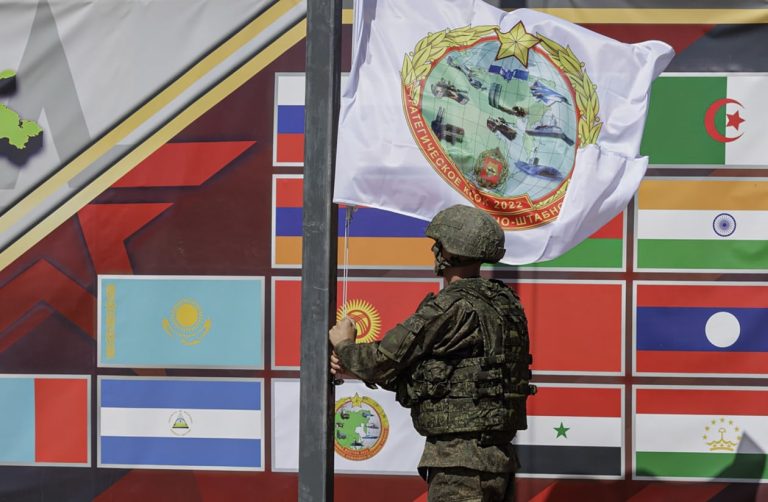5 de septiembre 2022

Children of Exile: The Births “Sowing Hope” in the Camp of Nicaraguan Farmers

PUBLICIDAD 1M
PUBLICIDAD 4D
PUBLICIDAD 5D
Neither Daniel Ortega nor General Julio Cesar Aviles referred to the Nicaraguan troops sent to the Vostok 2022 military exercises

A Russian soldier hoists a flag during the opening of the Vostok 2022 exercises. Below and to the left we see the blue and white flag of Nicaragua, one of the participating countries. Photo: EFE.
Daniel Ortega gave a speech at the celebration ceremony of the 43rd anniversary of the founding of the Army, without mentioning the serious crisis that Nicaragua is going through. He did not refer to any current events such as the display of political prisoners, the persecution of the Catholic Church, or the massive migration that the worsening of the crisis has caused.
Ortega and Army chief Julio Cesar Aviles did not mention the military maneuvers that take place in Nicaragua with the participation of foreign troops, or the participation of Nicaraguan troops in the Vostok 2022 military exercises being held in Russia, which end on September 7.
This Thursday, September 1, Russia began large-scale military maneuvers with the participation of 50,000 troops, 5,000 heavy weapons units, 140 aircrafts and 60 ships, the Ministry of Defense said in a statement quoted by the EFE news agency.
“The head of the Russian general staff, General Valery Gerasimov, will personally supervise the drills, which will involve troops from several former soviet republics, as well as from China, India, Laos, Mongolia, Nicaragua and Syria,” said the international edition of the British newspaper The Guardian.
This year’s Vostok exercises had only one-sixth of the military personnel that took part in them four years ago, when more than 300,000 troops were mobilized, making them Russia’s largest show of force since the Cold War. However, military contingents from only two countries—China and Mongolia—took part in Vostok 2018, compared to the thirteen that attended the current edition.
A presidential decree by Ortega authorizes the “departure from national territory, on a rotating basis, of fifty (50) Nicaraguan military personnel, as well as ships and aircrafts to the Russian Federation, to participate in an exchange exercise and military instruction in humanitarian aid operations with the Armed Forces of the Russian Federation,” valid for the entire second half of the year.
At the Managua event, Daniel Ortega dedicated himself to repeating his version of Nicaraguan history in which he questioned the Catholic Church, which he accused of having put itself at the service of foreign interests during a couple passages of history, although without saying that this week his agents are holding a bishop hostage, sentenced Monsignor Leonardo Urbina to 30 years in prison, and there is a seminarian and four priests who chose to go into exile to avoid the harassment of the regime.
As part of his review of history, Ortega recalled that in the 60s and 70s guerrilla fighters “were captured and released after having us detained for a few months.” Today, his judges and police are holding almost 200 prisoners of conscience in the regime’s prisons, most of them accused of fabricated crimes, whose brief presentation this week served to confirm the deterioration of their health.
At the international level, Ortega took the opportunity to send a message of solidarity to the Vice President of Argentina, Cristina Kirchner, whom he defined as “a courageous, determined woman…a victim of a brutal campaign of slander, false accusations and lynching,” who had just suffered an assassination attempt.
Meanwhile, General Aviles thanked his commander (Daniel Ortega) for incorporating professional soldiers into a pension system for the first time.
Aviles defended the thesis that Nicaragua is the safest country in the region, not only because it has the lowest homicide rates, but also saying there are no clandestine airstrips or drug syndicates in the country, and because the “containment wall” prevents the movement of large amounts of drugs, thus there are not so many consumers in the country.
This article was originally published in Spanish in Confidencial and translated by Havana Times
Archivado como:
PUBLICIDAD 3M
Periodista nicaragüense, exiliado en Costa Rica. Durante más de veinte años se ha desempeñado en CONFIDENCIAL como periodista de Economía. Antes trabajó en el semanario La Crónica, el diario La Prensa y El Nuevo Diario. Además, ha publicado en el Diario de Hoy, de El Salvador. Ha ganado en dos ocasiones el Premio a la Excelencia en Periodismo Pedro Joaquín Chamorro Cardenal, en Nicaragua.
PUBLICIDAD 3D